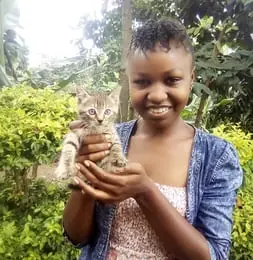
A kitten will become more affectionate if:
It is not separated from its mother too soon, and raised in a loving home which helps it become well-adjusted.
Make your kitten more affectionate by:
- Providing a safe environment.
- Handling it often.
- Exposing it to new experiences and people.
Watch out for subtle signs of affection.
The best part about being a cat owner is being able to cuddle with your pet. For this reason, many people want to have a friendly cat; one that loves to hang around their owner.
If you are wondering if your kitten will turn out to be that way, keep reading. This article will tell you if your kitten will become more affectionate.
How to Make Sure your Kitten is Well Adjusted
Granted, kittens can have varying personalities. Some kittens don’t like sitting on your lap, but they follow you everywhere. Others just want to sit beside you as you watch the TV.
Cats show affectionate in different ways from what we expect, which might be disappointing if you were hoping for a loving, cuddly kitty.
But, the odds of your kitten becoming more affectionate increase if it is well adjusted.
How you treat your kitten can spell the difference between having a socialized affectionate feline, or one who is fearful and aggressive towards humans.
Raising a well-adjusted kitten begins when it is still with its mother. According to the American Hospital Association, nursing kittens are less likely to have behavioral issues later on.
The first interaction a kitten encounters is with its mother and kittens. This time allows your kitten to be properly socialized, and ensures your little one grows up into a cuddly and affectionate cat.
This is why it’s not advisable to separate a kitten from its mother too early; before it’s 8 weeks old. Doing so can make your kitten grow up into a withdrawn and less socialized cat.
Kittens can Become Affectionate Over Time
Cat experts agree that a kitten’s behavior can change as it grows into an adult cat. With time and patience, there is always great improvement in their level of affection, even in feral cats.
It’s also good to keep in mind that the varying personalities of kittens make them show affection in different ways. It’s up to the cat owner to see the improvement in their kitty’s affection.
If your cat previously did not like being handled, but recently you see it rubs its face against your feet when you get home, this is a great improvement.
It shows that your kitten feels comfortable and safe around you, even though it does not want you to be so touchy.
Watch out for these subtle signs of affection most people miss, and so assume their furry friends are not affectionate:
- Slowly blinking at you: When most people see this gesture in their kitten, they assume it’s because of boredom, which is not true. When your kitten makes eye contact, then slowly blinks, it is communicating affection.
- Kneading, even if not on you: Moving their front paws back and forth on your lap or a soft surface beside you as it looks at you is a way your kitty shows you are important to them. It’s also a sign that they are happy and content.
- Showing you its belly: If your cat rolls on the floor and shows you its belly, it’s a sign of trust. Its tummy contains vital organs, so exposing this body part shows it trusts you.
- Lift tail high and twitch at the end: This is how cats greet each other when they are happy.
- Bringing your prey: Cats are predators, and occasionally your kitty might bring you a dead or half-dead rodent. Sharing meals among felines is a sign that they view you as part of their family.
Avoid Scaring your Kitten

No matter how long you have been with your kitten, it’s good to realize that kittens don’t understand human language. So, when your kitty misbehaves, this is not an excuse to discipline them.
Actions such as shouting at it, spraying water, or hitting your kitten make them fearful of humans. They won’t understand the reason behind your actions.
Never discipline your kitten harshly. Reward them when they do well, and don’t reward them when they engage in undesirable behavior. For instance, if a kitten uses its litter tray but previously it had elimination problems, reward it with a treat.
If it poops elsewhere in the house, don’t reward it.
Loud noises also startle your kittens, such as from a hairdryer or a vacuum cleaner.
How to Make your Kitten More Affectionate
Socialization in a kitten begins when it is between 3 and 9 weeks. This is the best time to teach your kitten to become a lap cat.
Here are things you can do:
1. Expose it to new experiences and people
Find a safe environment to gently expose your kitten to new experiences and people. This helps your kitten to develop positive behavior towards humans, and other pets in the house.
Hold and pet your kitten as you introduce it to other household members. Just ensure you supervise the situation, so no one is hurt in the process. Kittens can sometimes freak out when meeting other people for the first time.
A newly adopted kitten finds itself in a new environment, and it is natural for it to be fearful. A male kitten might explore the house, and they often find new experiences to be a great adventure.
Female kittens are shy and may be reluctant to investigate their new environment. Some kitten owners say that when their kitten was newly adopted, they used to hide under the cupboard or the bed.
2. Handle as much as possible

One of the best ways to ensure your kitten becomes affectionate is to handle it often. Make it a habit to groom, pet, and hold your kitten so that it becomes used to these activities.
Talk to your little one in a soft voice as you hold it, calling it by its name.
Don’t force the kitten if it does not want to be held. Just wait for the right moment to bond with your feline companion. With lots of gentle practice, your cute furry friend will grow comfortable with being held.
It’s also good to create opportunities for your kitten to get used to your laps on its terms. For example, if your kitten is timid, place treats beside you and sit on the floor as you read a book.
Ignore it, and you will be surprised to see your kitten approaching you. Have a relaxed body language.
3. Be the mother figure
Feed your kitten often, give it treats, play with it, and give it lots of affection and attention. A mother cat does these things to her kittens to bond with them. Petting your kitten is the equivalent of the mother licking their kittens, which is a soothing and calming action.
Cat toys allow you to bond with your kitten. Sometimes this does not have to be complicated. You can throw a ball of paper across the room, and your kitty chases it.
Try to set aside 30 minutes each day to play with your kitten. Remember, mother cats play with their kittens to teach them hunting skills, and teach them the right way to play without being aggressive.
4. Adopt the cuddliest cat breeds
If you would like to have an affectionate kitten, these breeds are known to be the cuddliest. Try adopting one of these:
- Himalayan
- Main Coon
- Scottish Fold
- Siamese breeds
- Persian
5. Make your kitten feel safe
Your kitten needs to grow up in an environment that makes them feel safe to be confident and affectionate. Especially for kittens just getting used to your home, it’s important to keep them in an extra room.
Include all their necessities in this room; food and water bowl, litterbox, toys, and a warm bed. Ensure other people or pets don’t come into this room.
After a few days, your kitten feels comfortable enough to navigate other rooms of the house. However, keep its safe room easily accessible so that it can go back wherever it feels like it.
6. Catnip
Most cats are crazy for catnip and since it can act as a natural mood enhancer, use it for your feline’s enjoyment. Sprinkle a pinch of dried catnip near your cat.
Some kitties paw on this aromatic herb, while others rub their face on it. Catnip is the secret to having an affectionate cat; they jump and start to chase on an invisible prey, rub their bodies against their owners, or just become frisky.
While your kitten is in this elated mood, sneak in for some soft petting.
7. Earn your kitten’s trust
Respecting your kitten’s space is essential to building a strong bond with them. If your feline is the non-affectionate one, try to be calm and avoid being pushy.
Don’t force interactions or play. Let your cat do these things with you on its terms. They then learn to associate you with good things, and thus you earn their trust.
